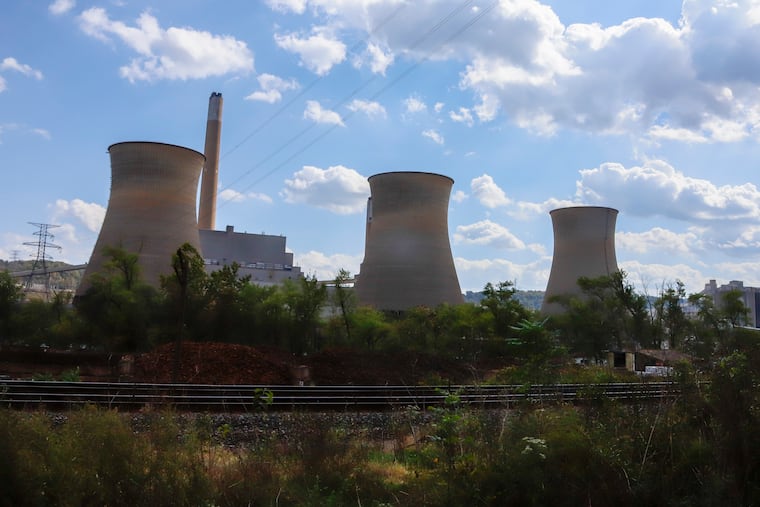The missing piece in the response to climate change: carbon pricing | Opinion
No other policy mechanism would work as cost-effectively to boost energy innovation and guide the economy in a cleaner direction.

From deadly heat waves and wildfires on the West Coast to extreme storms like Hurricane Ida, climate change is knocking at our door. While it can be difficult to link any individual climate event to our warming planet, we know that climate change will make impacts like these more frequent and severe.
Here in Pennsylvania, the risks are especially pronounced. Climate change will bring stronger storms and greater flooding, endangering human safety and critical infrastructure. A warming planet also threatens to diminish air quality and increase the spread of pests, invasive species, and ticks that cause Lyme disease. And that’s just the start.
» READ MORE: In the wake of Ida’s destruction, Philly needs lifesaving water resilience | Opinion
That’s why it’s more important than ever that Congress rises to meet the moment.
Fortunately, a clear and growing majority of Americans want leadership on climate change, and Congress is beginning to respond. From the Trillion Trees Act proposed by Republicans to the Civilian Climate Corps proposed by Democrats, there is a wide range of climate proposals.
However, missing in action is one of the most important climate tools of them all: carbon pricing. As Treasury Secretary Janet Yellen underscored, “We cannot solve climate change without effective carbon pricing.”
Carbon pricing would impose a fee on carbon emissions, creating an economy-wide incentive to transition away from high-carbon energy and embrace cleaner alternatives. Instead of allowing fossil fuel companies to continue to emit for free — at great cost to our economy — carbon pricing would provide a clear market signal to speed the transition to clean energy.
No other policy mechanism would work as cost-effectively to boost energy innovation and guide the economy in a cleaner direction. In fact, experts suggest that carbon pricing of just pennies per pound of CO2 would deliver far greater emissions reductions than any other climate tool.
While an initiative like the Regional Greenhouse Gas Initiative — which Pennsylvania is slated to join in 2022 — only establishes a carbon price on some industries in some states, a national carbon fee would apply a uniform carbon price across all industries in all 50 states.
Carbon pricing will also generate revenues. Returning these “carbon dividends” to citizens as direct checks would help make the policy both popular and durable. This approach would put money back in the pockets of American workers and families and provide a salient benefit that voters recognize and appreciate. We need only look to the COVID-19 relief checks and child tax credits to see how popular these direct checks would be.
Given these merits, carbon pricing and dividends have earned a remarkable breadth of support.
Over 3,500 U.S. economists, including many here in Pennsylvania, have endorsed this policy approach. So too have the National Academies of Sciences, Engineering, and Medicine, as well as leading companies and business associations.
» READ MORE: Congress can help Philly plant more trees | Opinion
On climate change, good intentions are welcome. But what matters most is results. That’s why, with so much at stake for our generation, young people are coalescing around this critical policy solution.
The student body presidents of more than 400 colleges across the country, including those from Penn State and the University of Pennsylvania, have united in support of carbon dividends. This group includes young Republicans and Democrats alike, highlighting the bipartisan appeal of this market-based plan.
And just a few weeks ago, more than 700 high school student leaders from all 50 states — including winners of national science, debate, and economics competitions, Scripps National Spelling Bee champions, and more — joined forces to advance the carbon dividends strategy.
As climate change continues to grow as a national priority, our elected leaders will need to step up and hammer out solutions that work. Sen. Bob Casey has already proven himself to be an environmental champion, including supporting investments in clean water infrastructure, the revitalization of the Civilian Conservation Corps, and other measures to protect the Keystone State.
Now we must stick the landing and unleash one of the most important tools to address the climate challenge. Congress has the clear opportunity and authority. It just needs to act. At this pivotal moment, leading on carbon pricing would help secure our futures and, with it, our generation’s eternal gratitude.
Nadeem Demian is from Pittsburgh and a graduate student at the Yale School of the Environment as well as the Yale international and development economics program.